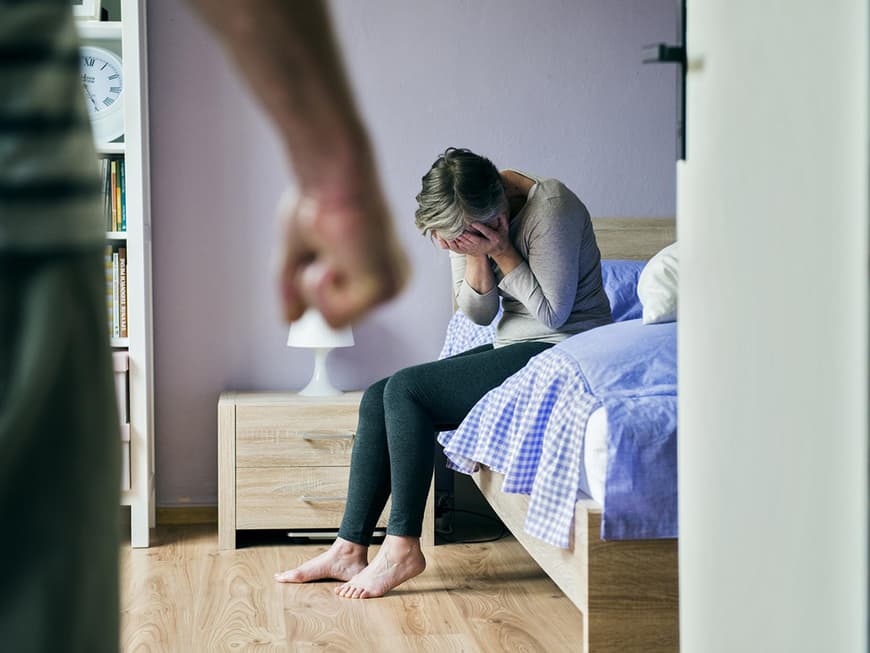
He grabs her roughly by the arm. As she tries to pull away, he lunges. She ducks, trying to avoid his blows. But he has already hit her. In the face. Her lower lip bursts open, blood drips onto her light-colored blouse. She cries quietly. Then he pushes her - she staggers against the wall, then collapses. He leaves the room - leaving his wife crying on the floor.
It's a scene that Yvonne has experienced many times before. And she is not alone. One in four women in Germany experience physical violence in their relationship.
Yvonne experiences physical violence in her relationship
Yvonne also lives with violence in her marriage. Harald (39) and she met in a bar 13 years ago. He is a student, she works as a clerk at an insurance company. "He looked so good standing there leaning against the bar. He was interesting, funny, charming and ambitious. He was a man you could only admire. I looked up to him." Harald courted Yvonne and wooed her. This flattered the then 23-year-old. They had an intense relationship. "He was temperamental right from the start, sometimes a bit choleric. On the other hand, he was a dream man in many other respects."
After graduating, Harald went into the private sector, had lucrative jobs and traveled a lot. Yvonne always has his back. Friends and family quickly saw them as the perfect couple. "We complemented each other very well at the beginning. And: Harald also has an extremely caring and loving side. When he was like that, I felt like the most desirable and happiest woman on this earth."
Harald's idea of a perfect marriage also included children. The couple tried for several years, but at some point it was a certainty: Yvonne was unable to have children. "That was a blow for us, of course. I felt inferior and had the impression that I was destroying Harald's future." And indeed, the man from Düsseldorf gives his wife this feeling.
He is ashamed of his wife
In front of work colleagues and friends, and even his family, he now claims that he and Yvonne made a conscious decision not to have children. What Yvonne initially thinks is a nice gesture by her husband to protect her from questions turns out to be a calculated lie during an argument. "During an argument, he told me that it was all my fault that we couldn't start a family and that he was embarrassed to have a disabled wife who couldn't even have children. So he would have to lie to everyone so that no one would find out what kind of person he was getting involved with."
Yvonne is completely shocked by her husband's words. She had never seen him like this before. When Harald realizes what he has verbally done to his wife, he apologizes profusely and assures her of his love. "The next moment he acted as if I had misunderstood him and somehow I believed him. Because what I had heard from him simply couldn't be true."
But now the dam seems to have broken. Harald regularly insults his wife. Afterwards, he explains to her that he only flew off the handle because she had provoked him or he had had a particularly stressful day. In the time between the verbal derailments, Harald behaves like a loving husband. For this reason alone, Yvonne finds it difficult to take real offense at his outbursts and draw the appropriate conclusions. But his words hurt her deeply every time. "At some point, I felt really guilty and responsible for everything. The more he said things like that to me, the smaller I became."
"We were the perfect couple in public"
But instead of telling a friend or her mother about her husband's humiliating behavior, she played the happy wife on the outside. "Also, because we were this perfect couple in public, I thought that no one would believe me anyway. So I just tried to stop provoking him and adapt to him."
At some point, however, it was no longer enough for Harald to just psychologically beat up his wife: He lashes out. "We had an argument, he was unhappy about something, had a stressful day at work, was irritable, and that's when it happened: he hit me. I could hardly believe it. He almost immediately fell to his knees in front of me, begging for forgiveness. And what about me? I believed him. Maybe, I thought, everything would go back to the way it was before." But it didn't.
Harald strikes more and more often. At least once a month he now pushes her, grabs her roughly, pulls her hair or hits her in the face with his hand. Why doesn't Yvonne leave him? "I know he doesn't mean it. It's not entirely his fault, I seem to be provoking him with my behavior. And besides, who is going to believe me? I've been with him for so long, it's completely unbelievable." So Yvonne continues to adapt. She does not realize that she is not to blame for this state of affairs, but only her violent husband.
It is only when her mother discovers the bruises on her daughter's body during an impromptu visit that Yvonne breaks down and confides in her. Full of shame, she tells her about the years of humiliation and physical and psychological violence. Because Yvonne refuses to leave her husband, her mother now wants to take her to a counseling center for women. Yvonne has already canceled the appointment twice. But her mother refuses to give up ...
Tips and information on domestic violence in relationships
How many people are affected by domestic violence?
A new study by the Ministry of Family Affairs and the Federal Criminal Police Office shows that domestic violence is on the rise: Domestic violence is on the rise. In figures, this means that 127,457 people were victims of their partner or ex-partner in 2015. That is 5.5 percent more than three years ago.
Are the victims still predominantly women?
Yes. 82 percent of all victims are women. However, the number of male victims has also risen. While it was 16.5 percent recently, it was already 18.2 percent in 2015.
And in which situations does the violence take place?
Most acts of violence, 63% in total, take place within a marriage or a non-marital relationship. In 37% of cases, violence only occurs after the relationship has ended.
Do the violent people come from the lower classes?
No. A study published in 2009 shows that people from middle and high educational and social classes are victims to a greater extent than was previously known.
Why do women stay with their violent husbands?
The reasons are very complex. In many cases, the abused woman is put under a lot of psychological pressure. A very typical reason is Jekyll and Hyde syndrome. The abuser has two faces. On the one hand, he pretends to be extremely loving, on the other hand, he abuses through words and/or actions. It is difficult for most of those affected to understand that their partner has two different personalities that seem impossible to reconcile.
You can get help here:
- Advice via the "Violence against women" helpline is free of charge and available in 15 foreign languages. In addition to those affected, relatives and friends can also get advice here. Tel.: 0 80 00/11 60 16
- The "Weisse Ring" helps victims and their relatives. There is a free telephone line, online advice and on-site advice. www.weisser-ring.de
- The association "Frauenhauskoordinierung" offers the opportunity to contact all women's shelters throughout Germany. www.frauenhauskoordinierung.de
Scenes recreated, names and locations changed to protect the victims.






